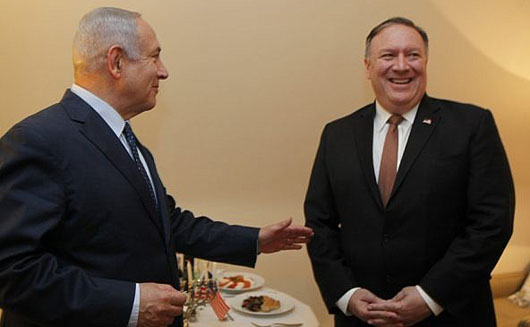by WorldTribune Staff, December 4, 2018
“Iranian aggression” in the Middle East was billed as the main theme of Dec. 3 talks between Israeli Prime Minister Benjamin Netanyahu and U.S. Secretary of State Mike Pompeo in Brussels.
Pompeo on Dec. 1 had slammed Iran over what he described as its recent testing of a medium-range ballistic missile.

Pompeo tweeted: “The Iranian regime has just test-fired a medium range ballistic missile that’s capable of carrying multiple warheads. This test violates UNSCR 2231. Iran’s missile testing & missile proliferation is growing. We condemn this act and call upon Iran to cease these activities.”
IRNA quoted Foreign Ministry spokesman Bahram Qasemi as saying in response to Pompeo’s remarks: “Iran’s missile program is defensive in nature… There is no Security Council resolution prohibiting the missile program and missile tests by Iran.”
Qasemi did not confirm or deny that Iran had carried out a new missile test.
Under the UN resolution enshrining the 2015 nuclear deal with Britain, China, France, Germany, Russia and the United States, Iran is “called upon” to refrain for up to eight years from work on ballistic missiles designed to deliver nuclear weapons.
The Dec. 3 meeting between Netanyahu and Pompeo also focused on the various threats emanating from Iran, including factories in Lebanon producing precision missiles and reports of Iranian planes unloading precise weaponry in Beirut.
At the beginning of the 4-hour meeting, Netanyahu said to Pompeo: “I want to thank you for your work and statements about Iranian aggression following its recent violation by shooting ballistic missiles. I am looking forward to discussing with you the ways we can work together to block Iranian aggression in the region – in Syria, Iraq, Lebanon and other places, and to continue the efforts for peace and security for all.”
Hizbullah recently posted a propaganda video on social networks in which the terror organization warned that it had the ability to launch precise attacks on Israeli infrastructure sites and military bases if the Israel Defense Forces (IDF) attacked in Lebanon.
Netanyahu said in recent months that he would not allow Iranian weapons to be sent to Lebanon.
During his address to the UN Security Council in September, Netanyahu said “Iran is directing Hizbullah to build secret sites to convert inaccurate projectiles into precision-guided missiles. Missiles that can target deep inside Israel within an accuracy of ten meters.”
Netanyahu, who held up photos during that speech of what he said were three of those sites near Beirut International Airport, said that he had a message for Hizbullah: “Israel also knows what you’re doing, Israel knows where you’re doing it, and Israel will not let you get away with it.”
During the meeting in Brussels on Dec. 3, State Department spokeswoman Heather Nauert said Pompeo reiterated the U.S.’s support for Israeli’s “security and absolute right to self-defense and to fighting anti-Israeli bias at the United Nations.”
Pompeo also mentioned the U.S.’s “support for warming ties and increased dialogue between Israel and its neighbors in the Middle East and Africa, including Oman and Chad,” Nauert said. “Secretary Pompeo noted the strength of the U.S.-Israel alliance and our multifaceted cooperation. He reiterated America’s resolve in confronting the totality of the Iranian regime’s threats through maximum pressure.”
Netanyahu and Pompeo also discussed the U.S. proposal to condemn Hamas, which will be brought for a vote at the UN later this week.
Check Out Geostrategy-Direct __________ Jump Start the U.S. Media
